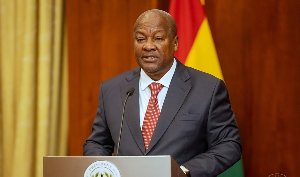Opinions of Thursday, 12 September 2013
Columnist: Karikari, Isaac
The Fuss and Farce about Age and Politics
The Fuss and Farce about Age and Politics (Ghana): Let’s Buck the Trend
Isaac Karikari (bkkarikari@yahoo.com)
Recent developments suggest that not so long after the Supreme Court’s ruling the battle lines have been drawn or more appropriately, they are being drawn for 2016. One of the main issues, implicit in the discussions, is AGING.
Politicians have often cited the age of their opponents as a way of discrediting them or questioning their ability and capacity to engage in politics or work effectively in the offices they aspire for. This occurs in both intra- party and inter-party circles. It appears Age is becoming a basis for establishing people’s competency and eligibility to hold office.
With ex-Prez Kufour’s exit imminent in 2008, age was used as a factor in calling into question the competencies of certain people who vied for his party’s (NPP) flagbearership for the impending national elections of that year. At the inter-party level, during the recent electioneering campaign it was once again an issue. This time round Nana Akuffo Addo’s age was considered a weakness in his profile. It is a point that was repeatedly thrust out there. During that period, some political commentators and propagandists arbitrarily sought to redefine “youth” and “youthfulness.” That is what is happening once again.
Though this may be politically expedient it is socially unreasonable and irresponsible. It is also academically and intellectually bankrupt. Further, it is culturally defeating and even politically incoherent and contradictory. And it is even morally wrong. There is a slew of studies showing that aging does not necessarily mean retardation and the setting in of senility (1). For those who may be tempted to consider the moral wrongness as something that is laughable they need to think again. There is a place for morality and scruples in politics. If not, then we should cease talking about things such as the GYEEDA report, the Woyome scandal and other cases of corruption, and even the use of indecent language in political discourses.
Would we want to be seen as a people who promote equal opportunities for all, encouraging both young and old to take on more active civic roles but yet rundown those who seek to do so?
Obviously, it is a calculated and mendacious plot, and one of the bits in a grand scheme to win or hold onto political power. This idea or assumption feeds into negative and stereotypical views of old people. It can be very stigmatizing and maligning. Through such remarks legitimation is given to the negative assumptions, misconceptions and stereotypes of the elderly such as they being senile and demented etc.
Age, and perceived youthfulness should not be the sole determinant of choosing candidates and appointing people to public and political office. It should not be the sole basis for acceptance or disqualification. To push this notion that people are either too young or too old further, a logical outworking of it will be the illogical deduction that those aging/the aged and the elderly have no role to play in our politics. If that is the case then political and social institutions such as the Council of State, and even the Peace Council should be scrapped.
Those endorsing such a position are digging their own graves. They are setting up gallows on which they themselves will later be hanged. They should not forget that time does not stop still for anyone. Aging is natural.
We should not push people into oblivion and obscurity just because it seems politically expedient to do so. For those who do so, it is the very progress and the wellbeing of the nation they profess to love, and desire to serve that they undermine.
It may sound like smart thinking, and a stroke of genius but it is shameless and vile propaganda masquerading as truth and fact and it should be seen and exposed for what it is. It is guile and mischievous to the core.
Classism, elitism and tribalism as well as ethnocentrism are common in our party and national politics and with this recent issue it seems we are creating grounds for ageism too. Adultocracy and jeunism are equally wrong and should not be encouraged.
Are there gerontological and geriatric associations in Ghana? Professionals in welfare and human service agencies especially those offering care to the aging/aged/the elderly, civil society organizations and Ghanaians in general should help hold this in check before it gains root in our society.
We should not be deluded into thinking good governance is determined solely by the age of the people running the affairs of the state. We should have more substantive discussions and buck the trend and scourge of cheap politics.
References
1 Apt, N. (2012). Aging in Africa: Past experiences and strategic directions. Ageing International, 37(1), 93-103.
Burr, J. A., Caro, F. G., & Moorhead, J. (2002). Productive aging and civic participation. Journal of Aging Studies, 16(1), 87-105.
Fernández-Ballesteros, R., Zamarrón, M., Díez-Nicolás, J., López-Bravo, M., Molina, M., & Schettini, R. (2011). Productivity in Old Age. Research on Aging, 33(2), 205-226.
Gonzales, E., & Morrow-Howell, N. (2009). Productive engagement in aging-friendly communities. Generations, 33(2), 51-58.
Karasawa, M., Curhan, K. B., Markus, H., Kitayama, S. S., Love, G., Radler, B. T., & Ryff, C. D. (2011). Cultural perspectives on aging and well-being: A comparison of Japan and the United States. International Journal Of Aging And Human Development, 73(1), 73-98.
Martinson, M., & Minkler, M. (2006). Civic engagement and older adults: a critical perspective. Gerontologist, 46(3), 318-324.














